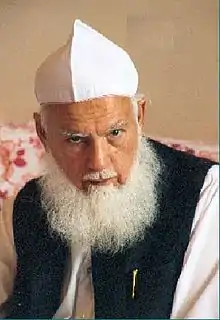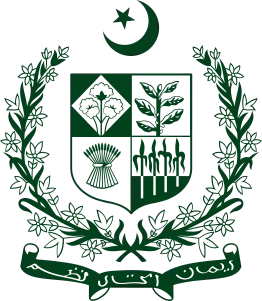Muhammad Karam Shah al-Azhari
Muhammad Karam Shah al-Azhari (1 July 1918 – 7 April 1998) was an Islamic scholar associated with Barelvi movement from Pakistan who also claimed to be associated with the Chishtiyya Sufi order.[1][2]
Muhammad karam Shah al-Azhari | |
|---|---|
محمد کرم شاہ الأزھری | |
 | |
| Born | Muhammad Karam Shah 1 July 1918 |
| Died | 7 April 1998 (aged 79) Islamabad, Pakistan |
| Alma mater | Al-Azhar University |
| Children | Shaykh Muhammad Amin al-Hasanat Shah, Hafeez Ul Barkat Shah, Major Ibrahim Shah, Mohsin Shah, Dr. Abulhassan Shah Al-Azhari, Farooq Bahawal Haq Shah |
| Part of a series on |
| Barelvi |
|---|
 |
|
Early life and career
Muhammad Karam Shah was born on 1 July 1918 at Bhera, Sargodha District, British India.[1] He finished his basic education in his hometown Bhera in 1936. Then he learned Persian and Arabic languages. Then on the advice of Khwaja Qamar ul Din Sialvi (1906 – 1981), he went to Muradabad, in 1942 for the study of Hadith. He graduated from the University of the Punjab in 1945 and then went on to Egypt for higher religious education at Al-Azhar University. He received his masters degree in Islamic Law.[1]
Muhammmad Karam Shah al-Azhari is well-known and notable for being the author of the book "Zia un Nabi", a 1995 Urdu biography of prophet Muhammad.[1][3] The book contains 7 Volumes. Later, it was translated into English language also having 7 Volumes by Muhammad Qayyum Awan.[4] He is also recognised for writing Tafsir Zia ul Quran, an Urdu interpretation of Quran in 5 volumes.[5][6][7]
He reorganized the Islamic institution Dar al Ulum Muhammadiyyah Ghausiyyah established by his father in Bhera and brought major changes in the syllabi of religious education. He was of the view that modern education also should be learned along with religious education.[1]
Muhammad Karam Shah al-Azhari was an active participant in the Pakistan movement and vigorously campaigned in the Indian provincial elections, 1946 for All India Muslim League.[1]
Muhammad Karam Shah al-Azhari also served as a justice of the Supreme Court of Pakistan until his death in 1998 and had served on its Shariat Bench.[1] He became a justice of the Federal Shariat Court, when it was first established in 1981.[1][8]
Bibliography
- Tafsir Zia ul Quran (1995) (in five volumes)[9]
- Zia un Nabi (1995) (a detailed biography of prophet Muhammad in seven volumes)[1]
Awards and recognition
- Sitara-e-Imtiaz (Star of Excellence) by the Government of Pakistan
- Pakistan Post Office issued a commemorative postage stamp to honor him in its 'Men of Letters' stamp series (2004)[10]
Death
Muhammad Karam Shah al-Azhari died on 7 April 1998 after being ill for nearly a year.[1]
References
- Muhammad Sultan Shah. "Diya'al-Quran: A Unique Quranic Commentary and the Commentator (profile of Muhammad Karam Shah al-Azhari)" (PDF). University of the Punjab website. Retrieved 21 September 2019.
- Distinguished Al-Azhari scholar of the 20th century honoured in international conference on The World Organization for al-Azhar Graduates (UK website) Published 29 July 2016, Retrieved 21 September 2019
- "Zia-un-Nabi (Urdu) - Maktabah Mujaddidiyah". maktabah.org. Retrieved 21 September 2019.
- "Zia un Nabi : English 7 Vol's - £69.99 : Madani Propagation, Online book shop". islam786books.com. Retrieved 21 September 2019.
- "Tafsir Zia-ul-Quran Urdu : Free Download & Streaming : Internet Archive". archive.org website. Retrieved 21 September 2019.
- "تفسیر ضیاء القرآن، اردو - Maktabah Mujaddidiyah". maktabah.org. Retrieved 21 September 2019.
- "mohrasharif.com - Tafsir Zia-ul-Quran - Volume 1 to 5 (Urdu)". mohrasharif.com. Retrieved 21 September 2019.
- Some new faces in Sargodha Dawn (newspaper), Published 26 August 2002, Retrieved 21 September 2019
- Books of Muhammad Karam Shah al-Azhari on goodreads.com website Retrieved 21 September 2019
- Profile and commemorative postage stamp of Muhammad Karam Shah al-Azhari on paknetmag.com website Retrieved 4 October 2019
